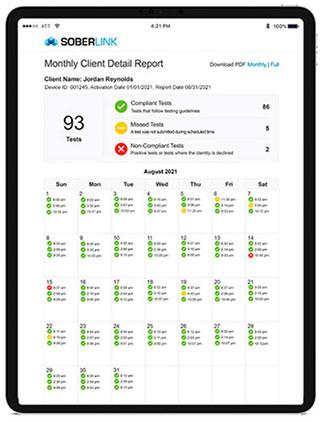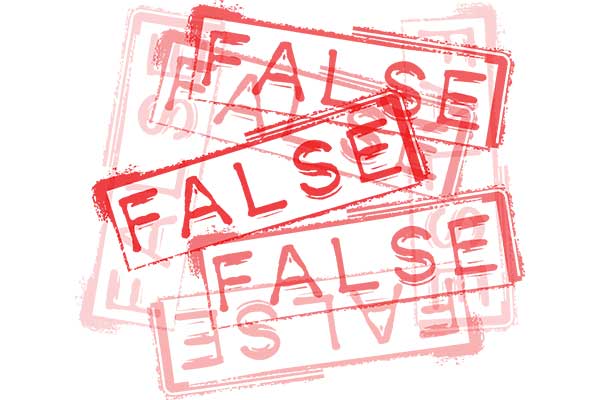When your client is falsely accused of alcohol abuse, Soberlink alcohol monitoring can provide evidence to successfully refute these claims in court.
By Soberlink, Experts in Remote Alcohol Monitoring

Understanding the Rules of Evidence
To ensure that only admissible evidence is used in court, there are three rules of evidence you should review with your client. This way, you can exclude evidence without a proper foundation before it becomes part of your trial strategy. These rules include relevancy, personal knowledge, and hearsay.1
- Relevancy: All evidence must be deemed relevant to prove or disprove a disputed fact in court. When children are involved, claims of alcohol abuse are relevant versus a division of property case with no children.2
- Personal Knowledge: Under various state evidence codes, including California, two types of witnesses exist: expert witnesses (such as child custody evaluators and forensic psychologists) and lay witnesses (such as family members, friends, or others who personally know the defendant). Lay witnesses do not include someone who simply knows of the defendant and heard something through hearsay.1
- Hearsay: Evidence of a statement made by someone other than the testifying witness stated as truth.3 Like personal knowledge, this includes instances where someone details information that they heard about the situation or individual in-person, without witnessing it themselves.
Gathering Evidence to Refute False Accusations
Tangible evidence that is admissible in family court can include testimonies, documents, photos, and videos. For cases involving accusations of substance abuse, drug and/or alcohol tests are often required as evidence. For Cleveland-based family law attorney Marshall Wolf, when allegations of alcohol abuse arise in his cases, the first action he takes is to sign his client up for Soberlink remote alcohol monitoring.
“When the allegation comes up, immediately get onto Soberlink as fast as you can so that by the time a hearing comes up, you have at least some degree of protection,” Wolf advises. With facial recognition and plan options to meet each client’s need, Soberlink automatically documents proof of sobriety in real-time and provides detailed testing activity reports. These reports have been validated and utilized in Family Law courts across the United States and Canada for nearly a decade. Whenever allegations of alcohol abuse are present in Wolf’s family law cases – which occur approximately two to three times a year – Soberlink is the tool that he turns to.
In one case where allegations of domestic and alcohol abuse were made against his client, Wolf recalls that “We immediately put our client on Soberlink. By the time that case came up for trial, we had so many test results that it affected the credibility of the complaining witness to the point that our client was acquitted.” With Soberlink’s detailed printout of over 300 test results, Wolf was able to protect his client from allegations of alcohol abuse and prevent his client from facing the parental alienation proposed by the plaintiff. Instead, Wolf’s client was granted shared custody of the young child. Wolf highlighted Soberlink’s ability to detect any minor changes in testing and give a prompt to retest to prove sobriety.
When to Utilize Soberlink Alcohol Monitoring

Monitoring can include Level 1, in which testing is only required during parenting time, and Level 2, which requires daily testing. Each level is designed to make parenting time safer with discreet and convenient alcohol testing and can be chosen based on clients’ unique situations. As clients are typically willing to take a variety of measures in order to maintain custody of their children, Wolf considered it very telling when clients oppose Soberlink as an option.
To demonstrate sobriety 24/7 while going through court proceedings, the Level 2 monitoring may be considered to prove consistent sobriety – with or without the child present, until the custody agreement concludes. When Wolf’s client was granted shared custody of the child, their request to vacate the order requiring Soberlink in the final hearing was granted. In his partner’s case, Soberlink is still being utilized as a safety net to ensure that the plaintiff cannot falsely accuse them of drinking again. “If they do, then those allegations hold no weight,” Wolf says.
To learn more about how to protect clients against allegations of alcohol abuse in your custody cases, visit Soberlink’s resource page for family lawyers.
1 Three Rules of Evidence To Know In Family Law Cases – Ciyou & Dixon, P.C. Attorneys at Law
2 Presenting Evidence in Family Court, Part 1 – Levine Family Law Group
3 California Legislative Information, Evidence Code
Soberlink’s real-time alcohol monitoring system can provide evidence to refute allegations of alcohol abuse; its court-admissible technology has been used for custody cases in courts across the U.S. and Canada to prove sobriety and provide peace of mind. A version of this article originally appeared on Soberlink’s website. www.Soberlink.com
Related Content
Hearsay in Custody Cases Involving Alcohol Abuse
When alcohol abuse is a concern, alcohol monitoring can be a vital component of a custody/co-parenting agreement that is enforceable by the court system.







